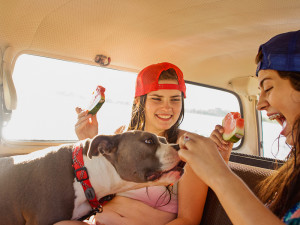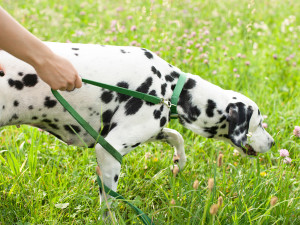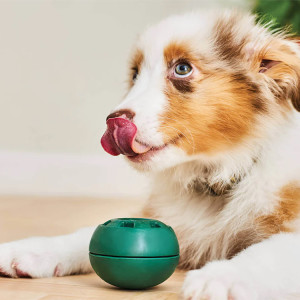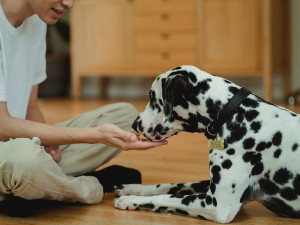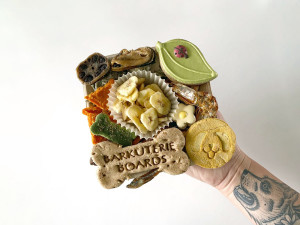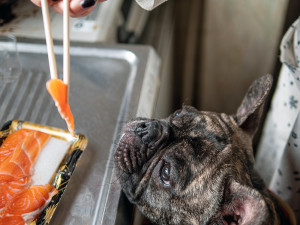Can Dogs Eat Ice Cream?
Summer is here, after all.

Share Article
Ice cream may be your go-to dessert, and with so many amazing varieties ranging from small-batch artisanal blends to childhood favorites like the ice cream truck, you may be wondering if your pup can indulge in a sweet frozen treat, too.
Unfortunately, ice cream is not a good choice for dogs for many reasons. While it is usually not toxic for them, ice cream does contain a lot of ingredients that are unhealthy for dogs and can make them sick. Read on to learn more about why you shouldn’t let your dog eat ice cream — unless it is a dog-safe ice cream on a special occasion.
Nutrition facts about ice cream for dogs
Ice cream contains multitudes. It can be made in a variety of ways with lots of different ingredients, so no two ice cream treats are really the same. The basic recipes for making ice cream typically include some combination of heavy cream, whole milk, sugar, and flavoring, as well as egg yolks occasionally. Some ice cream is even made even more decadent with mix-ins including chocolate chunks, nuts, fruit, candy pieces, and more.
One thing that is consistent is that traditional ice cream is always high in fat, high in sugar, and contain lots of dairy, which allows for that rich, creamy, taste and texture. And while fat, sugar, and dairy all contribute valuable nutrients in moderation, foods that contain large amounts of these ingredients are not healthy for dogs.
Is ice cream good for dogs?
Ice cream is not good for dogs, so if your dog is drooling over your sundae, be prepared with an alternate treat to offer them some consolation. Ice cream is rich in many ingredients that can be unhealthy for dogs, as well as some that can make them sick or can even be toxic. This includes:
Lots of dairy: Dogs are considered to be lactose-intolerant since they do not have enough of the enzyme, lactase, to properly break down and digest dairy products. If they eat a lot of dairy, they are at risk for digestive upset including vomiting, diarrhea, and gas.
High in fat: Ice cream needs to have a high-fat content to give it that rich, creamy texture and to avoid being too icy or watery. Usually, this fat source comes from high-fat dairy foods, like cream, whole milk, and/or egg yolks. Foods that are high in fat can cause digestive upset for many dogs and can trigger more serious pancreatitis for some pups. Additionally, high-fat foods are also high in calories, which means that they can contribute to unnecessary weight gain if they are consistently part of your dog’s diet.High in sugar: While sugar is an important source of energy for dogs, too much sugar is unhealthy for them. It is also a contributor of excess calories, putting dogs at risk for weight gain if they are eating a lot of high-calorie snacks on top of their primary diet. Weight gain puts dogs at risk for obesity and related health problems including diabetes and arthritis.
Toxic ingredients: Depending on the kind of ice cream, many flavors may contain other ingredients or mix-ins that are actually toxic for dogs. This would include chocolate, raisins, and nuts like pecans, macadamias, and walnuts. These toxins carry more serious health risks and should be completely avoided.
Can dogs eat non-dairy ice cream?
Even non-dairy ice creams are not a healthy choice for dogs. While these ice creams skip the high fat dairy, they contain other high-fat ingredients to create that creamy texture. Often, they replace dairy with soy milk, nut milk, or coconut cream and many also have added fat from cocoa butter as well.
These high-fat options still put dogs at risk for digestive upset and pancreatitis, and some of their added flavors could still be toxic if they contain chocolate, raisins, nuts, or other unsafe mix-ins.
Is doggie ice cream completely safe for dogs?
Doggie ice cream is specifically made for dogs so they won’t contain toxic ingredients like chocolate, but most still have unhealthy ingredients like:
High-fat content: High-fat foods can lead to digestive upset for some dogs, and put some dogs at risk for pancreatitis. These foods also add additional calories to the diet, leading to weight gain and obesity-related health problems.
High sugar content: These foods also add a lot of sugar and calories to the diet, carrying similar risks of weight gain and obesity-related health problems.
If you do want to give your dog the very occasional frozen sweet treat, there is plenty of dog-safe ice cream that is safer than human ice cream options. They are still considered unhealthy and should be saved for a special occasion like their birthday or gotcha day and offered in small portions.
If your pup has a history of health problems, including diabetes, previous episodes of pancreatitis, or other ongoing conditions, be sure to check with your vet first as to whether this is a safe option. For healthier options, consider creating your own frozen treats made from ingredients that are safe and healthy for your pup.
The bottom line: Can dogs eat human food?
There are many human foods that are safe and healthy to share with your pup. It’s important to do your research ahead of time to ensure that the foods you plan to share do not contain any toxins for dogs, and that they are generally healthy for dogs to eat. Most of the time, this means sharing plain, whole foods, like safe fruits, vegetables, or lean proteins without any oils or seasonings.
When it comes to prepared dishes with lots of ingredients, you’ll need to know the recipe to ensure that all of the ingredients are safe. It is also very important to keep in mind that dogs have specific nutritional requirements, and the bulk of their diet should come from a complete and balanced dog food.
If they are filling up on lots of treats and table snacks, they may miss out on vital nutrients and be at risk for nutritional deficiencies. Additionally, offering too many snacks to your pup can lead to overfeeding and put them at risk for weight gain.
Dogs who are overweight may develop health problems including diabetes, arthritis, and more. The best option is to provide your dog with a healthy, balanced dog food diet and to use snacks and safe human foods sparingly as a form of enrichment.
Other foods that are safe for dogs
Bananas, carrots, and these other fruits and veggies are safe options for dogs.
Superfoods like kale, pumpkin, and sweet potatoes are also healthy choices.
Eggs are a high-protein option that are safe for dogs as well.
Other foods that are dangerous for dogs
Pecans, as well as walnuts and macadamia nuts, are all considered toxic to dogs.
Onions, garlic, chives, and leeks are all part of the Allium family of plants that are toxic to dogs.
Grapes and raisins are toxic and well and should be kept out of reach of dogs.
FAQs (People also ask):
How much ice cream can a dog eat?
They should not eat ice cream; itcontains many ingredients that can make them sick. An occasional lick of a nontoxic flavor may be OK for some dogs but should be mostly avoided to be safe.
Is it OK to give dogs ice cream?
Ice cream is not good for dogs and can make them sick. It is not a good choice to share with them.
Why do dogs like ice cream?
Dogs may be attracted to the small or cold texture; however, there are other foods that can be used as a healthier cool treat for dogs.
Can dogs eat non-dairy ice cream?
Non-dairy ice cream still has too much fat and sugar to be good for dogs, so it should be avoided, too.
References:

Dr. Amy Fox, DVM
Amy Fox, DVM is a small animal veterinarian in New York City. A lifelong animal lover, Dr. Fox studied biology in college and then worked as a veterinary nurse before pursuing veterinary school at Cornell University. She has worked in many different settings including shelter medicine, emergency medicine, general practice, and animal cruelty and forensics. She is especially interested in nutrition, preventative medicine and care for senior pets. Dr. Fox also enjoys writing about veterinary medicine and teaching. In her free time she loves to cook, garden, and go for long runs.
Related articles
![A dog sniffing for something in the grass.]()
Bug Bites: Cricket Treats Your Pet and the Planet Will Love
The future of dog food is looking a little less beefy and a little more buggy.
![Mini shepherd laying on ground licking pupsicle toy]()
The Pupsicle Will Soothe Puppies Who Need to (Literally) Chill
Woof’s innovative fillable design will help dogs de-stress and their parents save money.
![A man holding out a dog biscuit to a Dalmatian on a kitchen floor.]()
Recipe for Seeded Dog Biscuits
Learn how to make your own basic dog biscuits packed with nutritious seeds and sweet apples.
![happy dog with birthday cake in dog bowl]()
How to Celebrate Your Dog’s Gotcha Day
No party animal can resist pupcakes and scavenger hunts.
![A person's hand holding up a Barkuterie Charcuterie Board with banana chips and other dog treats]()
Barkuterie Boards Are the Perfect Gotcha Day Treat
Spoil your pup with an artfully arranged charcuterie board of jerky strips, baked biscuits, and pet-safe crudités. What more could a four-legged foodie want?
![Feeding raw salmon or sashimi to young French bulldog]()
10 Healthy “People” Foods for Dogs
You might be surprised that these common health foods are totally safe for pups.




